google-site-verification: google85f203565cb16b4c.html
Making Better Thought-Movies One Truth At A Time
_________________________________
The Parable of the
Cruel Vinedresser
The Cruel Vinedresser parable illustrates the "entitlement" conflict workers can have with owners who, in fact, have absolute rights to their profits.
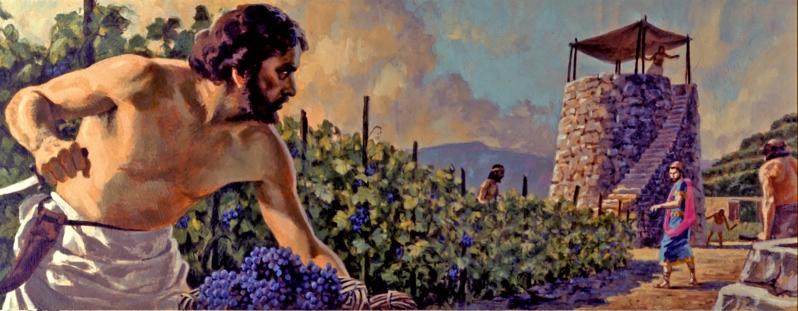
The Parable of the Cruel VineDresser:
Matthew 21:33-41
33 Listen to another parable: There was a master of a house who planted a vineyard and put a hedge around it and dug a wine vat in it and built a watchtower. Then he let it out [for rent] to tenants and went into another country.
34 When the fruit season drew near, he sent his servants to the tenants to get his [share of the] fruit.
35 But the tenants took his servants and beat one, killed another, and stoned another.
36 Again he sent other servants, more than the first time, and they treated them the same way.
37 Finally he sent his own son to them, saying, They will respect and give heed to my son.
38 But when the tenants saw the son, they said to themselves, This is the heir; come on, let us kill him and have his inheritance.
39 And they took him and threw him out of the vineyard and killed him.
40 Now when the owner of the vineyard comes back, what will he do to those tenants?
41 They said to Him, He will put those wretches to a miserable death and rent the vineyard to other tenants of such a character that they will give him the fruits promptly in their season.Why the Dispute of Who Gets the Harvest?
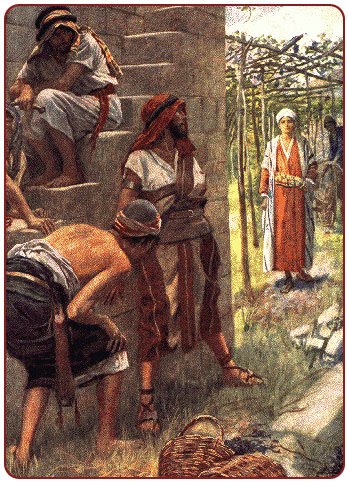
Owners have the full rights to the fruit of the vineyard. Here we see an ownership conflict created by cruel tenant's greed. Those who should have been content with their being paid for the work they did to keep the vineyard, decided that they deserved more, and sought to cut off all the profits from the true owners.
The owners had no other alternative than to forcibly remove the cruel tenants, and allow others to work the vineyard on agreeable terms.

|
Parables are powerful "word-pictures" that are meant to be engrafted into our thinking...as mental pictures do control our thought-life. That's where the "imagination" gets involved. The imagination allows mental exploration of the past, present, future. It is the ability to see pictures and images in the "movie theater" of the mind. The imagination is the "workshop" of the human mind. It is the only thing in the world we have complete control over. That's why GOD takes great interest of what goes on there, and judges what we allow to grow there - Genesis 6.5 |

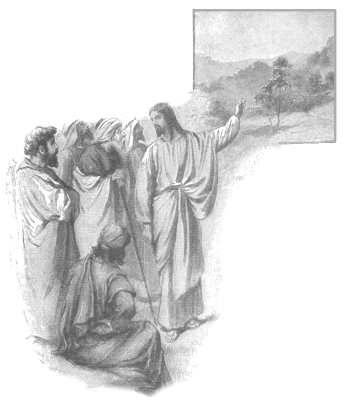 |
There are privileges to ownership
The owner had spent everything that was necessary for a thriving vineyard. The cruel tenant, or renter had NO expenses or money that he was required to pay out to build anything - and so that any claim of ownership could NOT possibly be valid.
|
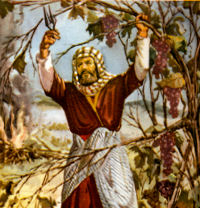
Do not confuse temporary use to ownership. Renting does not equal ownership.
Psalms 24.1 "The earth is the LORD's and the fullness thereof..."
GOD owns it all. And we are accountable to Him, as workers in His vineyard!
This is the cruel mis-calculation many make...
- They resort to violence to get what is not theirs.
- They seek to keep what does not belong to them
- They resent "ownership" by others
- People incorrectly feel they deserve more than "wages" - yet, they made no investment or take any risks
So, when the owner sent servants to collect what was due - greed and rebellion reared its ugly head...
Let's look at the rental agreement here -
- The owner allowed the cruel tenant or renter onto the property - to live there - until the harvest came - and the owner received his "rent" from the profits of the harvest
- The owner graciously took all the risk - because, he only received rent out of the profitable harvest.
- If there was a disaster, and no harvest - the owner did not get his rent
- There was NO risk financially to the renter - the husbandman. Everything needed for a substantial harvest had already been built - and vineyards do not get planted every year as do other crops such as corn, or wheat.
- The owner could have demanded a monthly "rent" which places the risk financially on the renter - he has to come up with the money before the harvest comes in...
- The agreement was favored toward the renter who was not at risk, yet greed and jealousy and the evil desire to grab it all still took over
- Hebrew 13.5 "Don’t love money; be satisfied with what you have. For God has said,“I will never fail you. I will never abandon you.”
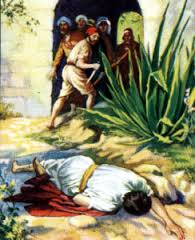
- The renters killed the servants who came on behalf of the owner to get paid the rent due
- They killed the owners son who came to get the rent due. He was sent on the premise that, as the owner's son - they would respect him. They didn't.
- Then, the question is asked...What do you think the owner will do when he has to come to the property?
The answer is -
The owner will put the renters to death, and rent out to people who will pay the rent when it is due.
- be faithful to fulfill what you have promised - "keep to the deal you made"
- pay what you owe, when it is due - remember the cruel tenant parable - where the end result for the cruel tenant was death
- be thankful for the opportunity of working in the vineyard
see also the parable of the Laborers and the wages
We need to remind ourselves what parables are, and the purpose they serve. Parables are word-pictures.
We are required to hide the word-picture in our "spiritual heart" - into the movie theater of the mind where the imagination and thought-life create images that control our thinking.
That's all! Know the word-picture itself - and allow the Holy Spirit of GOD to apply it to your life as He sees the need for GOD's wisdom and GOD information.
The danger of many teachings of this parable, as well as many others - is that each parable is linked to certain historical, present or future events, and they go ahead and wonderfully weave an explanation of what historical events "fit" the parable...
Here is the problem...
Historical explanations of the parables sound so very spiritual and are so measured by many - yet, in so doing, there is sometimes created an avoidance of all personal applications of the "word-picture" or the parable...
If I can explain a parable away, attaching it to certain events or persons - then I have effectively removed myself of personal responsibility, that, in fact, the word-picture mat actually apply to me - to my actions, attitudes, or thinking...
The fact is - the Holy Spirit of GOD uses parables as a communication platform to release instruction, guidance and warnings to us individually - the Holy Spirit very easily can convict us, and change our thinking by showing us the relevance of a parable to our situation...
IF we are smart enough to hide these "word-pictures" in our spiritual heart, we stand to reap the benefits of receiving "GOD information" in our lives.
Making Better Thought-Movies One Truth At A Time
_________________________________
Bible Study Lessons
- Abandonment
- Abilities
- Abortion
- Abuse
- Addiction
- Accusations
- Adultery
- Anger
- Apathy
- Ashamed
- Attitudes
- Backsliding
- Betrayal
- Bitterness
- Born Again
- Chance
- Conscience
- Deceit
- Deception
- Discipline
- Discretion
- Eyes of GOD
- False Witness
- Fear of the Lord
- Fear -Lord #2
- Flattery
- Friendship
- Fool, A
- Foolishness
- Forgiveness
- Giving
- Inheritance
- Injustice
- Instruction
- Judgment
- Kindness
- Knowledge
- Lawlessness
- Lies, Lying
- Misunderstand
- Pleasure
- Pride
- Problems
- Soft Answers
- Speech
- Understanding
- Vengeance
- Wisdom

Parables by Jesus
- Children of Bridechamber
- New Patch, Old Garment
- New Wine, Old Wineskins
- Treasures Old and New
- Spontaneous Growth
- Mustard Seed
- The Leaven
- Hidden Treasure
- Pearl of Great Price
- Dragnet
- The Soils
- Children at Play
- Wise and Foolish Builders
- The Wheat and the Tares
- Empty House
- Uncompleted Tower
- Rash King's Warfare
- Chief Seats
- Pharisee and Publican
- Two Debtors
- Unmerciful Servant
- Barren Fig Tree
- Bond Servant
- Unjust Steward
- Rich Fool
- Rich Man and Beggar
- Good Samaritan
- Laborers and the Hours
- Friend at Midnight
- Importunate Widow
- Lost Sheep
- Lost Coin
- Prodigal Son
- Elder Brother
- Two Sons
- Cruel Vine-Dressers
- Rejected Cornerstone
- Great Feast
- Wedding Robe
- Wise and Foolish Virgins
- Talents
- Good Shepherd